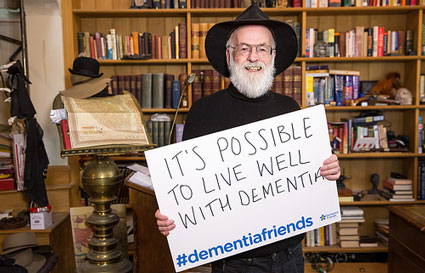Sir Terry Pratchett, the internationally renowned novelist was diagnosed with dementia in 2007 and it stunned him. He became one of the 47.5 million people living with a form of dementia worldwide; one of the 7.7 million people diagnosed with dementia annually and one of the new cases recorded every 4 seconds. Like so many others in his situation, the author was hurt and angered by the injustice of it all and condemned to stand helplessly, while day by day his posterior cortical atrophy (a rare condition) robbed him of his full self.
But he wasn’t a man to go quietly. While others might bow their heads and surrender to the ‘inevitable’, he began to ask questions…
Why should we accept the trajectory of the illness as inevitable?
Why is it that medical science can’t even say with any confidence what causes dementia or Alzheimer’s?
If the disease has been around for so long, why is it that we have made so little progress towards discovering a cure?

More famously, Pratchett demanded to know why a football club could spend more money on buying a mediocre player than the British government was prepared to spend on funding dementia research.
Between his diagnosis in 2007 and his untimely death in 2015, Pratchett worked tirelessly to raise awareness. From lending his name and voice to Alzheimer’s Society campaigns to increase funding for research and to improve the quality of dementia care in hospitals and care homes. Sir Terry took centre stage at countless conferences, spoke out in media interviews and demanded action from world leaders to stick by their promises to ultimately defeat dementia.
Sir Terry has also brought into focus a perhaps even more immediate issue. Right now, in 2016 we cannot offer a cure; we can only provide care. Due to the unpredictable nature of the condition, that care must be strongly person-centred and it must aim to deliver the best possible quality of life.
We at Daughterly Care salute the courage of a man who would not back away from a challenge. He declared:
“You can steal my memory, a cell at a time; you can trick my limbs into confusion and rob my eyes of sight but my joy, the joy that comes from being the person I am, you can’t touch that. It’s my life, my birthright and the homeland I will defend to my last breath.”

Like Pratchett, Daughterly Care has always supported the rights of Elders to live joyfully at home for their entire life.
Anyone familiar with our story — a true story you really must read — will know that we founded Daughterly Care over 21 years ago, in response to the need for Elders to receive better care than available in most institutions at the time.
We wanted to give Elders the option of living in their own homes, where they could preserve their dignity, retain their identity through close contact with family and friends and do the things that make them happy.
In particular, Live in Care (our most popular service) is designed to support Elders with high care needs in this very way and is a wonderful alternative to a Nursing Home.
From Judith, Daughterly Care Live in Caregiver
Just to let you know that my time with Jeanie was a delight. We gardened, chatted, did some housework together, sang a great deal, enjoyed some poetry and went for a walk over to the oval complete with a small bush walk to see the views across the valley to Chatswood and the City. We even stopped in the middle of the oval for a dance and song just because we could.
Appetite was excellent, fluid intake good and no problems. She slept through and was gracious. Lots of reminiscence despite her communication difficulties.
“Inside every old person is a young person wondering what happened to them…”
Sir Terry Pratchett
Terry Pratchett once said that “inside every old person is a young person wondering what happened to them”.
It’s an insightful comment and reminds me of a really great song I’ve always loved called ‘Hello in There’, by John Prine.
The song is all about how, as they grow old and stop work and the family moves away, many Elders become disconnected from the world around them and end up feeling lost and lonely. All because we as a society either don’t have time or have forgotten how to care for the person within.
But in fact it doesn’t have to be this way. We have specialised in dementia care for over 21 years with our in Home Care services. As part of our Joyful Living Approach™ we encourage our Elders to be actively engaged with the world around them, their friends and their family. They enjoy the personalised dementia care they receive and our aim is to assist them to live joyfully at home for life.
If joyful living is important to you or to someone you love, shouldn’t you at least consider the best alternative to a Nursing Home? There are no contracts required to use a Daughterly Care service so why not take Live in Care for a trial run? To discuss options or book a free private nurse care consultation, call Daughterly Care today on (02) 9970 7333.

Warmly,
Kate
Kylie Lambert B.Ec F Fin
(known to her friends for 25 years as Kate)
Daughterly Care CEO, Co-Founder and Owner

Having worked in home and in facility’s, I can attest to the calmness one has with this disease when elders are in familiar surroundings. When a client at an elderly age is moved out of their home for care, there is confusion and agitation. The long term settling in period is most times sadly resolved by the use of drugs. When I’ve worked caring for elders in their own homes, with this disease, life has more daily joy and contentment because THEY ARE HOME. The reassurance of ‘home’ is very important to someone with dementia. It lessens confusion, gives them dignity and sense of place. I can only compare this to when I travel. It’s all a good time, but we all love coming home. It’s the security and joy of what surrounds us, our photos, the garden, our own bed and the kitchen, all these things make for truly joyfully living.
Wendy, you see it every day with every client you visit and I can’t say it better than you have said it…it’s the security and joy of what surrounds us, our photos, the garden, our own bed and the kitchen – the heart of the home – all of these things, including the views, art and pets make for truly joyfully living. Thank you for taking the time to comment of what you see that makes people feel “at home” and “feeling joyful” for all their days.
Thanks so much for sharing your experiences Wendy. We hear so many stories just like this so often. Home offers stability and familiarity not found in institutions or in some else’s place. People living with dementia need as much stability and peace as possible to live joyfully. In fact, it’s not surprising to know that people who are not, living with dementia, often need the very same things.
I have worked with many dementia people over the years in there own homes and in all different facilities,and even in the best 5 star environment I have still found that they have been more comfortable and settled in there own homes,I have noticed over the years that when I have been assisting them in there own homes and then they have been transferred to a different environment, even an exceptional one, it really confuses them and more times than not they go down hill pretty quickly, so I really do believe the longer we can assist them to stay in their own home their life will be more contented, therefore happier.
Thank you for sharing your experience Kathleen. We have found our clients to be living much more joyfully in their own home than in a nursing home. And of course that brings us so much joy too.
Kathleen, we absolutely agree. Living in your own home is the ultimate when it comes to joyful living. Being in your own home feels natural and right, its an extension of you. Its where you feel most secure and comfortable. Its the place where we feel most ‘right’.
My client loves it when we play balloon games, it makes him laugh and smile, his dementia is advanced however this activity brings great joy to him. Last week he included his wife in this activity, and it was wonderful seeing the two of them hit the balloon to each other laughing, they have been married for over 60 years.
Angela, something so simple and yet so joyful – throwing and catching balloons. Joyful living in the moment that builds self esteem. Well done. You are a blessing to our clients with a contagious light personality.
In my experience as well as bringing laughter and joy which is so important, I also used another way of bringing contentment & satisfaction. I quietly before my visit researched a little about the profession that the client worked in and then I chose some interesting and relevant questions to ask at an appropriate time. This can be so stimulating and satisfying for the client as they relate special times about their career that they remember and they feel so pleased that someone was interested enough to enquire. If this happens in their own home they can (not always, depending on their level of dementia) go and rummage, finding something in a drawer that relates to what they were telling me. These have been some very special moments for the client and myself.
This is really great information thanks Lucy! Reminiscence Therapy can be used to great effect and create many joyful moments for both our client and the caregiver.
Lucy, thank you for sharing how you ‘enable joyful living’ with Daughterly Care clients. Whether you are consciously aware of it or not you are ‘enabling the client to be the expert’ by showing interest in their career of decades and this allows connection and self esteem to flourish. What a wonderful emotionally intelligent carer you are. You are a blessing to our clients. Thank you.